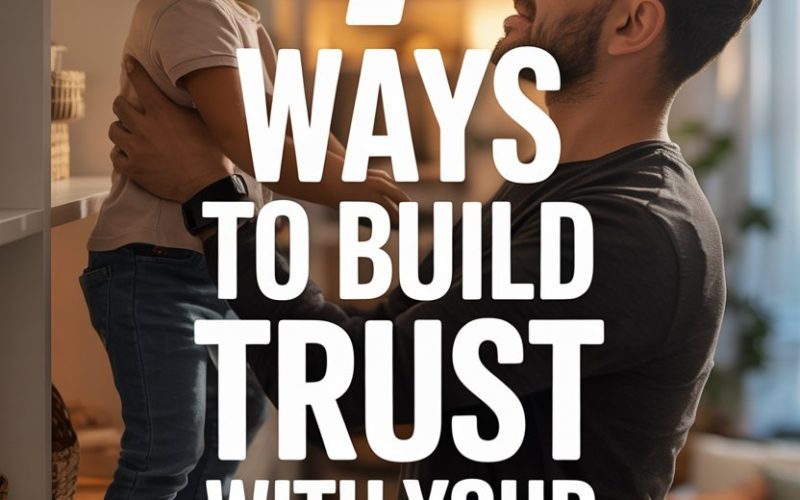Parenting and trust go together like peanut butter and jam—sticky at times, but absolutely essential.
Every child wants to know their parents are their safe harbour, their go-to, their “I can tell you anything, even about the weird rash” person.
For busy parents juggling work, laundry mountains, and dinosaur-shaped chicken nuggets, how can you really build trust with your child—without adding an extra hour to your bedtime routine?
1. Listen Like You Mean It
When your child barrels in, waving a drawing or shrieking about injustice on the playground, how often do you half-listen while answering emails or stirring the pasta?
Kids are master detectives. They can spot distracted eyes or the dreaded “uh-huh, that’s nice” a mile off.
Genuine listening is the foundation of trust, according to child psychologist Dr. Laura Markham.
Make eye contact. Put down the phone (yes, even if it’s buzzing). Nod, reflect, ask questions. Showing you value their words—no matter how small—teaches them their feelings matter.
Sure, the story might involve an epic battle with a sock puppet. Doesn’t matter. They’re learning you’re someone who cares.
2. Be Consistent, But Not a Robot
“Because I said so.” We’ve all said it. Sometimes it’s all that stands between you and losing your last marble. But consistent rules and routines help kids feel secure—they know what to expect.
If bed is at 8pm on Tuesday, but you’re suddenly chill with a midnight movie marathon on Thursday (and not just for a birthday), your child’s not sure where the boundaries lie.
Consistency doesn’t mean never changing—if you need to adjust, explain why. “We’re having a late night because Granny’s visiting from Glasgow. Tomorrow, it’s back to normal.” Predictability builds trust; arbitrary decisions do not.
3. Admit When You’re Wrong
Parents get things wrong. (Shocking, I know.) You misplace the P.E. kit, shout about the shoes left in the hallway, discover the shoes were actually yours.
Owning up, apologising, and making amends teaches your child that mistakes don’t break relationships.
In fact, research from Harvard shows that children who see adults admit fault are more likely to trust them—and do the same with others.
Imagine the power in, “I was wrong about that, and I’m sorry. Let’s figure it out together.” That’s next-level trust-building.
4. Keep (Reasonable) Promises
“Can we go swimming this weekend?” you say yes, but Saturday rolls round and you’re buried in work or the weather’s gone bonkers. Life happens.
Still, promises aren’t throwaway currency. Breaking them too often chips away at trust.
If you must change plans, acknowledge it. “I know I said we’d go swimming. The pool’s closed, but how about a movie at home and swimming next Saturday?”
Small children might not love it, but honesty about circumstances and making new plans shows respect for their feelings—and models how to keep commitments.
Just don’t promise a pet unicorn unless you’re ready for the existential fallout.
5. Respect Their Privacy (As Age Allows)
Ever had your diary read by an over-curious sibling? Not fun.
Children need privacy, even when they’re small. Knock before entering their room. Avoid shaming them for secret snack stashes or embarrassing questions.
As they get older, privacy becomes even more crucial—especially with devices and friendships.
That doesn’t mean you hand over the house keys and hope for the best.
Open communication about expectations (“I won’t read your messages, but if you’re ever in trouble online, I need to know you’ll tell me”) helps keep trust mutual.
The NSPCC suggests regular check-ins instead of surprise snooping; you’re building a bridge, not a surveillance state.
6. Stay Calm When They Mess Up
“Don’t worry, Mum, I only broke the vase because I was trying to see if the cat could jump over it.” That moment when your insides scream but you’re trying to look wise and unflappable.
If a child thinks a mistake will trigger a volcanic eruption, they’ll start hiding things. Cue the erosion of trust.
Try to breathe before reacting. Empathise, even if you’re internally weeping for your grandmother’s vase. “That’s frustrating. Accidents happen. Next time, let’s keep the cat-jumping Olympics outdoors.”
This doesn’t mean ignoring serious issues, but aiming for a problem-solving approach over a punishment parade.
A calm response now means your child won’t think twice about coming to you with bigger issues later.
7. Share Your Own Feelings and Stories
Too often, parents reserve their emotional lives for after bedtime, when the coast is clear and the chocolate biscuits come out. But sharing your own feelings (in an age-appropriate way) shows your child that being open is safe—and normal.
“I had a tough day at work. I felt disappointed, but I talked to my friend and felt better.” These small admissions create space for your child to do the same.
According to child development expert Dr. Tina Payne Bryson, modelling vulnerability helps children develop empathy and trust—they learn that everyone has struggles, and that it’s okay to talk about them.
Just maybe keep the details about Aunt Edith’s bunion surgery for adult ears.
Trust: The Gift That Keeps Giving
Building trust with your child isn’t a one-off event or a tick-box on the ever-growing to-do list. It’s a slow, gentle layering of moments—some big, some barely noticeable.
Every time you listen, admit a mistake, or keep a promise, you’re adding another brick to a foundation that will last them well beyond childhood.
No one gets it right every time. There will be days when you forget, react, or just need a moment to hide in the loo. That’s alright.
The best part? Even a wobbly bridge can hold strong when love and good intentions hold it up.
Tonight, when your child tells you about their day (whether it’s a saga about lost socks or a world crisis in Year 3), try listening with both ears.
The trust you build now will echo for years—right through the murky waters of adolescence and beyond.
Who knew trust could be built with a cup of tea, an apology, and a promise to try again tomorrow?
Turns out, you’re already halfway there.




